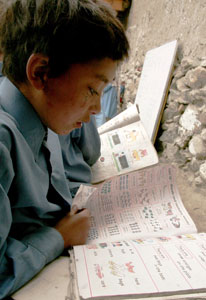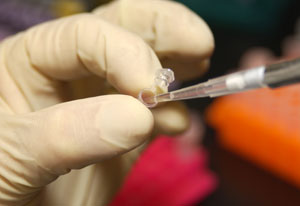Deafness studies will speed path to new treatments
May / June 2014 | Volume 13, Issue 3
Genes are behind much of the deafness that exists worldwide and research supported by the
National Institute on Deafness and Other Communication Disorders (NIDCD) - in large part from global health studies - has uncovered about half of the 50 known genes in which mutations cause deafness inherited as a recessive trait. This project is an ongoing collaboration with Dr. Sheikh Riazuddin, a researcher in Lahore, Pakistan.

Photo by Jacob Simkin/Photoshare
NIH-supported studies in Pakistan
and elsewhere have found that
some genes that rob children of
hearing are linked to other
conditions.
Clusters of deaf people within large families, fairly rare in the U.S., occur more frequently in some other countries. That has provided research opportunities for NIDCD-sponsored scientists and their collaborators to identify deafness-causing genetic mutations in Pakistan, the West Bank, Israel, India, Indonesia, Costa Rica and Brazil.
"Geneticists need large families to find the variants that cause a disorder," said Dr. Thomas B. Friedman, chief of NIDCD's Laboratory of Molecular Genetics. "You can find them in single individuals or small families, but it's much harder to be convinced that you've got the right change in the right gene."
By exploring genes in intermarried or large extended families with several deaf members, researchers have revealed dozens of mutations and tracked them in populations everywhere. "All of the genes that we've identified in Pakistan are the same genes that cause deafness worldwide, every single one of them," Friedman said. "None is unique to a particular country."
In the early 1990s, Friedman's research took him to Bali, Indonesia, to a village where deafness was so common that hearing people and non-hearing alike used a unique sign language. His team examined the DNA of 45 deaf people among the 2,200 residents and traced their hearing loss to a genetic mutation on chromosome 17. "It's a big, big gene and working on it taught us a lot about how the auditory system functions," Friedman said. "You might think, isn't that fun working in a Balinese village? But it allowed us to discover a major gene for deafness worldwide, including in the United States."
He has subsequently collaborated on global projects that have pinpointed genes culpable in deafness and other disorders as well. In Usher syndrome, which in the U.S. occurs in 1 per 25,000 births, children suffer not only from hearing problems but some of them also progressively lose their sight and develop balance issues. "The Usher mutations that we identified, which are found throughout the world, were all identified in Pakistani families."
Very few genes are exclusive to the auditory system, Friedman noted. "Most are expressed widely and some even ubiquitously," he said. "Unless you know what the mutation is, you don't know whether you're at risk for other, hidden disorders."
This was the case in Perrault syndrome, where a deafness gene found in three Pakistani families was subsequently linked to ovarian failure, abnormal organ development, movement disorders, learning disabilities and peripheral neuropathy. These discoveries came from international collaborations among several research teams, including those headed by Friedman, Dr. Sheikh Riazuddun of the University of the Pubjab in Pakistan, Dr. Mary-Claire King of the University of Washington, Dr. Suzanne Leal of Baylor College of Medicine and Dr. William G. Newman of Manchester University in the U.K.

Photo by Maggie Bartlett/NHGRI
NIH-funded global research has uncovered more
than 50 recessive genes tied to hereditary deafness,
bringing science closer to better treatments.
King, a long-term Fogarty and NIDCD grantee, has investigated deafness globally since 1990. Collaborating in Costa Rica then Israel and Palestine, her teams identified several genes for deafness in large families. She has also helped train global health researchers, contributing to research capacity in those countries.
Hearing loss from genes most often manifests in childhood, but at the other end of the spectrum, populations worldwide hear less as they age. That group is growing quickly and nearly half of people 75 years and older face some hearing loss, according to the NIDCD. To improve understanding of how this occurs, Dr. John H. Grose of the University of North Carolina, a Fogarty and NIDCD grantee, is measuring how listeners pick up speech amid background noise, so-called temporal masking, which can decline with age. His project includes English speakers in the U.S. and Portuguese speakers in Brazil, in collaboration with Drs. Denise Menezes and Silvana Griz, at Universidade Federal de Pernambuco.
Infectious diseases and their treatments, as well as insults to the brain or auditory system, can also damage hearing. These include repeated ear infections, loud noises, head injuries, hypoxia in newborns and more than 200 drugs - including some chemotherapies.
Relatively new on the scene is HIV and its antiretroviral treatments, which are both suspected of contributing to hearing loss. NIDCD grantee Dr. Jay C. Buckey of Dartmouth Medical School is leading a study with Muhimbili University in Tanzania to assess hearing in patients with HIV, either on treatment or not, and in those with tuberculosis coinfection. Early findings reveal increased hearing loss in adults with HIV who are on antiretrovirals.
NIDCD is supporting ongoing studies to generate more information on the environmental and genetic causes of deafness and hearing loss. Improved understanding of mutated genes will provide important information on hearing and brain processing. The identification of the relevant genes will also permit early and more accurate diagnosis of certain forms of hereditary hearing and communication impairments, as well as loss of sight.
More Information
Global Deafness Research
Access selected recent scientific papers on deafness global health research supported by NIDCD.
-
Auditory impairments in HIV-infected individuals in Tanzania
May-June 2014,
Ear and Hearing -
Mutations in TBC1D24, a gene associated with epilepsy, also cause nonsyndromic deafness DFNB86
January 2014,
American Journal of Human Genetics -
Perrault syndrome is caused by recessive mutations in CLPP, encoding a mitochondrial ATP-dependent chambered protease
April 2013,
American Journal of Human Genetics -
Loss-of-Function Mutations of ILDR1 Cause Autosomal-Recessive Hearing Impairment DFNB42
January 2011,
American Journal of Human Genetics -
Noncoding mutations of HGF are associated with nonsyndromic hearing loss, DFNB39
July 2009,
American Journal of Human Genetics -
DFNB79: reincarnation of a nonsyndromic deafness locus on chromosome 9q34.3
July 2009,
European Journal of Human Genetics -
Dominant modifier DFNM1 suppresses recessive deafness DFNB26
December 2000,
Nature Genetics -
A gene for congenital, recessive deafness DFNB3 maps to the pericentromeric region of chromosome 17
January 1995,
Nature Genetics
To view Adobe PDF files,
download current, free accessible plug-ins from Adobe's website.